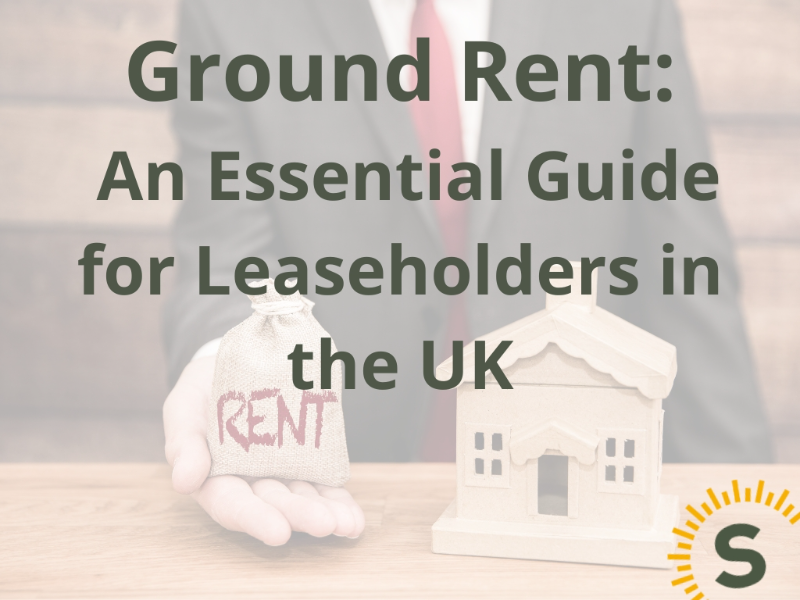
Understanding the financial obligations that come with owning a leasehold property can be complex, especially when it comes to ground rent. This essential guide aims to elucidate the intricacies of ground rent, offering clear, practical advice for leaseholders in the UK.
Ground rent is a charge for leasing the land on which your property sits. The landlord owns this land, and as a leaseholder, you are essentially paying for the right to use this land for the duration of your lease. This practice is an integral part of the UK property landscape and is completely legal.
It's one of the fees you pay if you own the leasehold of your property. This is a fee you pay to the freeholder of the property, also known as the landlord. This is not to be confused with the rent you would pay as a tenant, which is a charge for occupying a property owned by someone else.
To understand if you need to pay ground rent, it's crucial to understand the difference between leasehold and freehold property ownership. With a leasehold, you own the property and its land for a set period, usually between 99 and 999 years, stipulated in the lease agreement.
On the other hand, a freehold means you own the property and the land it stands on outright, with no time limit. This distinction is critical when discussing ground rent, as paying ground rent is only applicable to leasehold properties.
If you have a leasehold property, it is likely that you will need to pay ground rent. Although, this could be in the form of Peppercorn rent only, which is where you pay a nominal fee instead of a full bill.
Ground rent amounts can vary significantly, with some properties incurring a nominal fee of around £50 per year, while others might cost several hundred pounds annually. The specific amount is usually outlined in your lease agreement.
The way ground rent is calculated can vary, as there's no standardised method in the UK. It's also worth noting that the amount can increase over time, depending on the terms of your lease. Some ground rents are fixed, meaning they stay the same throughout the lease, while others are escalating, increasing at set intervals.
Ground rent covers the lease of the land from the freeholder. It does not typically include any additional services. As a leaseholder, you may also be responsible for annual service charges, which cover costs such as cleaning communal areas, maintaining gardens, and using on-site facilities like a gym or swimming pool.
Ground rent and service charges are often associated with leasehold properties, but they are not the same. Ground rent is a payment to your landlord, while service charges cover the costs of maintaining your building or its grounds. Depending on your lease terms, you may be required to pay both.
If you fail to pay your ground rent, the freeholder can take legal action against you to recover the money you owe. This could lead to a court order allowing the freeholder to recover their money and even regain possession of the property.
While you can't buy out your ground rent if you're a homeowner in England or Wales, you may be able to buy a share of the freehold. This would involve you and a majority of other leaseholders purchasing the freehold of the building.
In recent years, the so-called 'Ground Rent Scandal' has drawn attention to the issue of unfair ground rent charges. Some freeholders have used clauses in their lease agreements to excessively increase ground rent, leaving leaseholders unable to afford their charges and struggling to sell their properties.
This scandal has led to reforms in ground rent practices through the Leasehold Reform (Ground Rent) Act 2022. The Act outlaws ground rents on new long leases (21 years or longer) from 30 June 2022. This legislation is set to benefit around 4.5 million UK leaseholders, marking the beginning of a significant reform in leasehold property management.
For many new leases, ground rent has now been made illegal. However, for existing leases, you must continue to pay your ground rent. These changes were made under the Leasehold reform (ground rent Act 2022).
Ground rent is a critical aspect of owning a leasehold property in the UK. Understanding its implications, the potential costs, and how it can change over time is essential for all leaseholders. If you have further questions about ground rent or need help with other property-related matters, consider reaching out to a professional adviser or solicitor.

Stuart is an expert in Property, Money, Banking & Finance, having worked in retail and investment banking for 10+ years before founding Sunny Avenue. Stuart has spent his career studying finance. He holds qualifications in financial studies, mortgage advice & practice, banking operations, dealing & financial markets, derivatives, securities & investments.





Our website offers information about financial products such as investing, savings, equity release, mortgages, and insurance. None of the information on Sunny Avenue constitutes personal advice. Sunny Avenue does not offer any of these services directly and we only act as a directory service to connect you to the experts. If you require further information to proceed you will need to request advice, for example from the financial advisers listed. If you decide to invest, read the important investment notes provided first, decide how to proceed on your own basis, and remember that investments can go up and down in value, so you could get back less than you put in.
Think carefully before securing debts against your home. A mortgage is a loan secured on your home, which you could lose if you do not keep up your mortgage payments. Check that any mortgage will meet your needs if you want to move or sell your home or you want your family to inherit it. If you are in any doubt, seek independent advice.